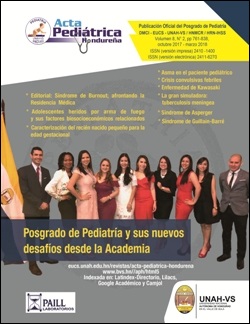Febrile Seizures: Comprehensive Review
DOI:
https://doi.org/10.5377/pediatrica.v8i2.7996Keywords:
Febrile seizures, diasnosis, genetics, recurrence, treatmentAbstract
The febrile seizures (FS) are the most common seizure disorder in childhood and a common reason for attendance in emergency departments. These are critical events that match fevers in children aged 6-60 months, without CNS infection, metabolic disorders, or previous neurological abnormalities. These disorders are benign and self-limiting character, without no long-term neurological sequelae. The prevalence of FS is approximately 2-5%, described a higher incidence in males with 60%, with a 2: 1 ratio. A child with a first-degree relative with FS have a risk of 4-5 times higher than the general population to develop FS, despite this some cases are sporadic, suggesting that genetic and environmental elements influence its appearance. The diagnosis is mainly clinical, complementary tests should be reserved to exclude other medical conditions. The only recommended treatment is the management of persistent acute crisis.
Downloads
4441

